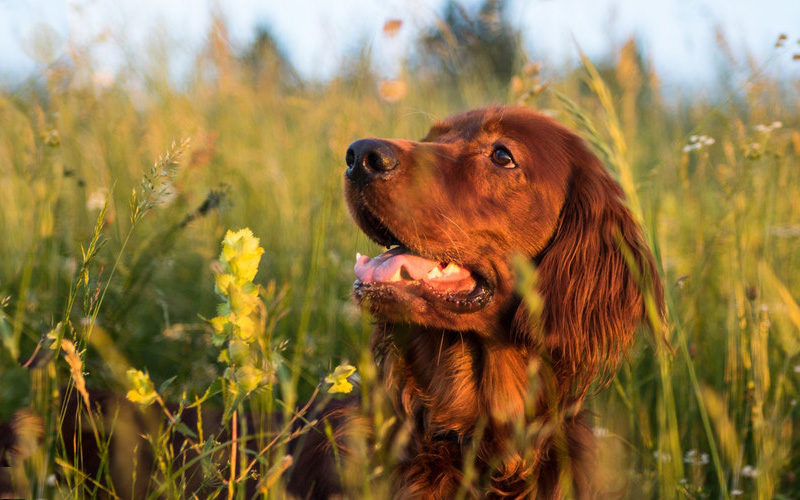Red setters, bulldogs and boxers among dog breeds most likely to have a wee problem
Male Irish red setters, boxers, bulldogs, bull mastiffs and fox terriers are more likely to develop urinary incontinence than the males of other dog breeds, according to new research.
Furthermore, purebred male dogs generally are 1.45 times more likely to suffer from involuntary leakages compared with their crossbred counterparts, suggesting a likely genetic component to the disease.
The Royal Veterinary College’s (RVC) VetCompass™ programme studied anonymised clinical data from 119 first opinion veterinary practices across England and found that one in every 100 male dogs is affected by urinary incontinence. Irish red setters were found to particularly suffer, with one in 12 of them affected, and the breed is 14 times more likely to have leakages than a crossbred dog.

Disturbingly, researchers also found that urinary incontinence was cited as the main reason or a contributing cause for being put down in 41.6% of the incontinent male dogs that were euthanised during the study.
The study has disproved previous veterinary opinion that incontinence, which is a hugely distressing emotional and physical issue for both owners and dogs and also imposes financial burdens on owners, mainly affects female dogs. The study is helping lift the lid on which diseases actually impact the most on dog welfare.
Further VVetCompass™ findings also include that older dogs are more prone to leakages, with male dogs aged nine to 12 years’ old 10.46 times more likely to suffer from the problem than dogs aged under three. There is no conclusive evidence to suggest that neutered dogs were more likely to develop this incontinence issue though.
Dr Dan O’Neill, Senior Lecturer in Epidemiology at the RVC and study co-author, said: “The most fascinating outcome of this study was the power to use Big Data to identify just how frequently some breeds show urinary incontinence in male dogs. One in twelve of all Irish Red Setters were affected and the breed was 14 times more likely to be affected than crossbreds. Using these types of data, we are finally lifting the lid on which diseases really impact most on dog welfare.”
Jon Hall, Senior Lecturer in Small Animal Surgery (Soft Tissue) at the University of Edinburgh and study co-author, added: “Urinary incontinence is a huge problem for dogs and people, with considerable welfare and financial impact. Until now, the vast majority of studies have focused on females since they were considered to be much more commonly affected. Whilst this remains true, a large number of male dogs presenting to general practice also show signs and we hope that by highlighting this problem by examining such large number of male dogs (which is only really possible with the VetCompass programme and the financial support provided by the generous grants provided by funding bodies), we can now better identify and recruit these patients for investigations and clinical trials to help treat this disease.”
RVC’s VetCompass™ project analyses anonymised veterinary clinical records from over 1,000 UK vet clinics to enhance understanding and improve the health and welfare of all companion animals.
This particular study focused on an estimated 1,027 urinary incontinence cases from the 109,428 male dogs that attended participating clinics between September 2009 and July 2013.
Research Reference
HALL, J. L., OWEN, L., RIDDELL, A., CHURCH, D. B., BRODBELT, D. C. & O'NEILL, D. G. 2018. Urinary incontinence in male dogs under primary veterinary care in England: prevalence and risk factors. Journal of Small Animal Practice. doi.org/10.1111/jsap.12951
Notes to Editors
For more information please contact:
- Alex Cassells (alexander.cassells@plmr.co.uk) or Ploy Radford (ploy.radford@plmr.co.uk)
- Press Line: 0800 368 9520
About the Royal Veterinary College
- The Royal Veterinary College (RVC) is the UK's largest and longest established independent veterinary school and is a constituent College of the University of London.
- The RVC offers undergraduate, postgraduate and CPD programmes in veterinary medicine, veterinary nursing and biological sciences.
- It is currently the only veterinary school in the world to hold full accreditation from AVMA, EAEVE, RCVS and AVBC.
- In 2017, the RVC received a Gold award from the Teaching Excellence Framework (TEF) – the highest rating a university can receive.
- A research-led institution, in the most recent Research Excellence Framework (REF2014) the RVC maintained its position as the top HEFCE funded veterinary focused research institution.
- The RVC ranked as the top vet school in the Agriculture, Veterinary and Food Science unit of the most recent Research Assessment Exercise, with 55% of academics producing world-class and internationally excellent research.
- The RVC also provides animal owners and the veterinary profession with access to expert veterinary care and advice through its teaching hospitals; the Beaumont Sainsbury Animal Hospital in central London, the Queen Mother Hospital for Animals (Europe's largest small animal referral centre), the Equine Referral Hospital, and the Farm Animal Clinical Centre located at the Hertfordshire campus.


